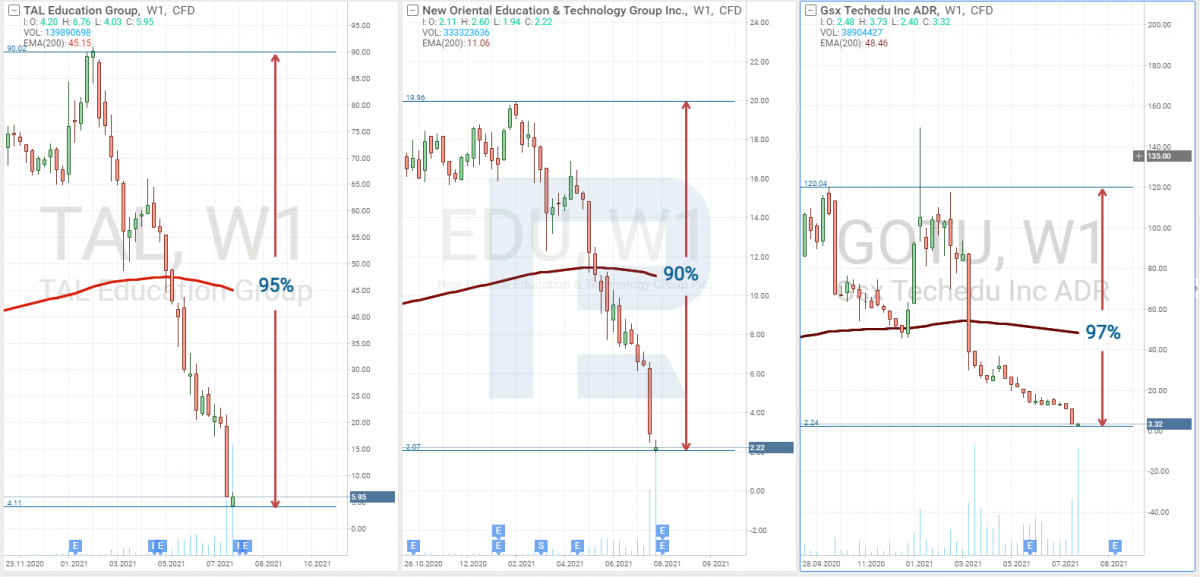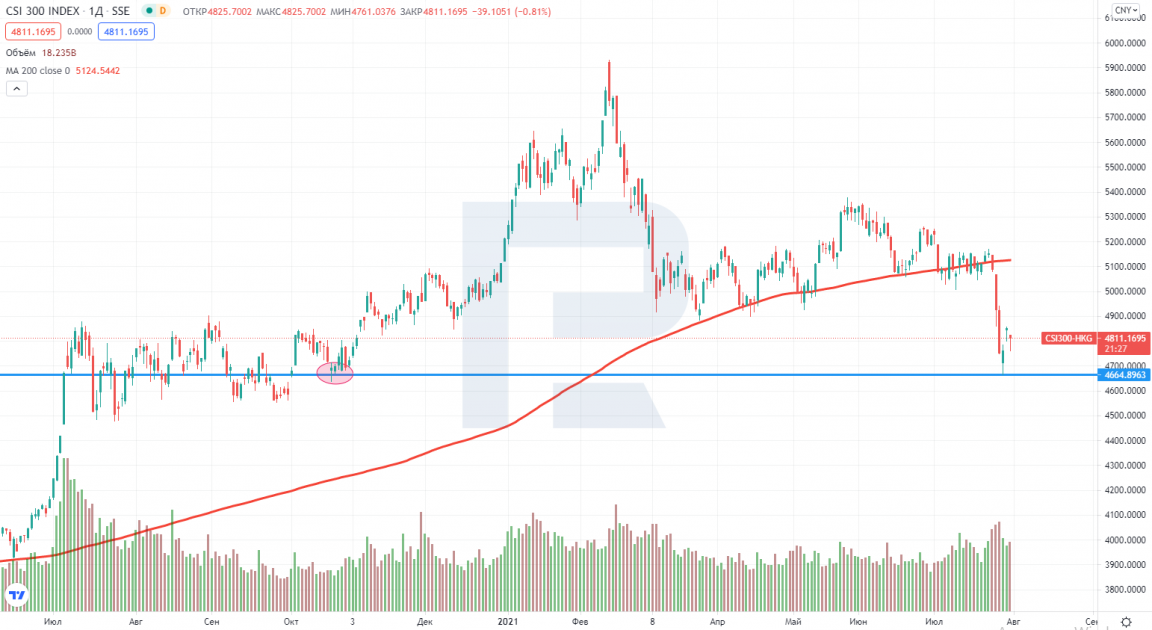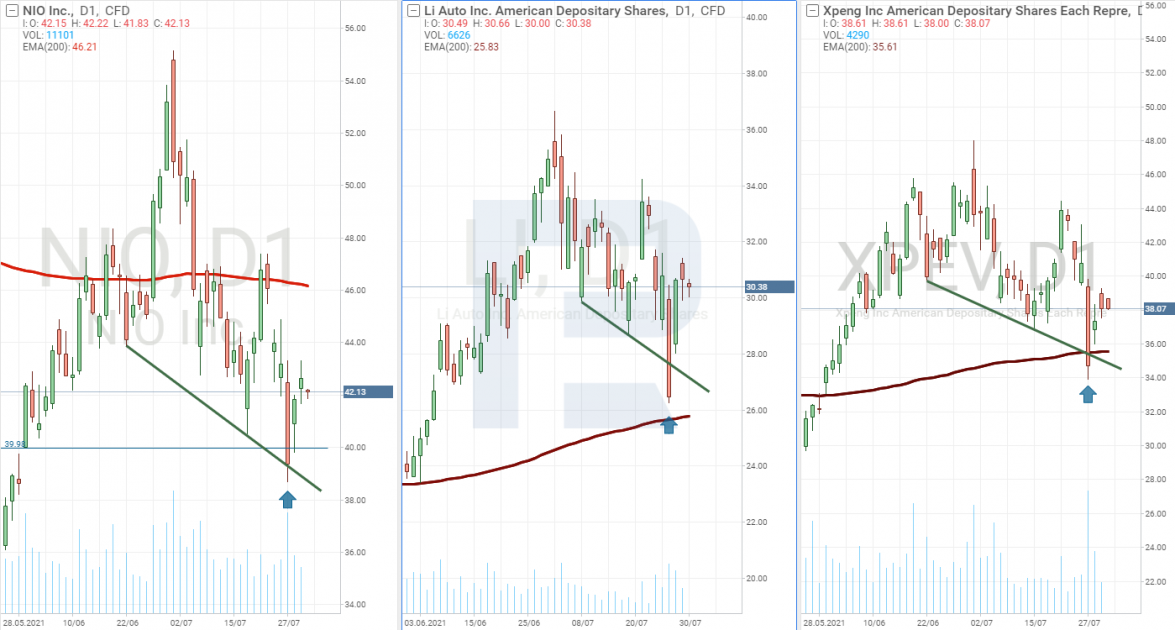NIO, Li Auto, and Xpeng: Good Time to Buy Stocks

8 minutes for reading
Crises are always a good time to buy stocks. At such times, shares of companies become oversold and have a good potential of growth. The tricky part is that crises happen quite seldom, once in 7-10 years, while we want to but stocks at appetizing prices much more often.
Good for those who prefer to buy shares in collapses, there are politicians who tend to interfere with companies’ business, causing irreparable damage to it. In such circumstances, investors decide to minimize risks and start selling the shares of even those companies that have nothing to do with the reforms.
China bans paid extracurricular education
This is what is going on in China these days. The government decided to improve the demographic situation and increase fertility. Currently, for bad demography they blame paid extracurricular courses that help students get prepared for entering prestigious higher education institutions.
According to the government, paid extracurricular education is a threat to the country because such services are available to more wealthy parents, and with time this might widen the gap between the wealthy and the poor, giving the former privileges in receiving higher education.
The decision made is supposed to improve the demographic situation: the less money parents spend on educating one child, the more children there can be in the family. However, this is just a theory, and only time will show how it works in practice.
As a result, companies providing private education services are forbidden to attract funds via IPO, and companies that have foreigners participating in their capital are given time to clean themselves from foreign money. Extracurricular lessons alongside pre-school activities on weekends and holidays are now totally banned.
Shares of Chinese educational companies depreciated
The measures taken by the government caused the shares of the country’s three largest educational companies fall. In other words, the government simply killed the market of commercial education.

The shares of TAL Education Group (NYSE: TAL) dropped by 95%, New Oriental Education & Technology Group (NYSE: EDU) shares - 90% и Gaotu Techedu (NYSE: GOTU) shares - 97%. It is highly probable that in the end, the companies might get delisted.
The government is trying to calm investors down
These events made investors nervous, and many of them hurried on to get rid of the shares of other Chinese companies, even those having no connection to education. This is illustrated by the decrease of the Chinese stock index CSI 300 to the lows since October 2020.

Realizing the scale of the problem it has created, the government tried o calm investors down, promising that the reform will only touch upon education. Officials hurried to meet the representatives of the largest investment banks in order to stop the sale of stocks. The People’s Bank of China spent 4.6 billion USD on buying the stocks.
If you take a look at the CSI 300 chart shown above, you will see a minor effect from pouring in 4.6 billion USD: the quotations were growing for two days. But how will market players react? Will they use the temporary bounce to close their positions with smaller losses?
Healthcare and real estate are under attack
However, problems do not limit themselves by the sphere of education. As you know, the stock market lives on expectations and suppositions. If the Chinese government, indeed, wants to improve the demographic situation, it will not stop at just educational reforms. Healthcare system can also be compromised.
Availability of healthcare services for citizens with a modest income is also an important fertility factor. The sector of real estate follows healthcare, hence, the crisis touched upon these spheres as well.
All in all, the actions of the government quickly made investments in Chinese assets toxic, so that everyone is craving or getting rid of them. For example, Cathie Wood, the famous manager of the Ark Invest trust, sold the shares of Chinese tech companies.
Should we really sell Chinese shares?
What Cathie Wood has done is not really an instruction. For example, she earlier sold the shares of Virgin Galactic with a loss three weeks before they grew three times.
Remember March 2020: coronavirus raging, quarantines everywhere, borders closed, stock indices falling. Who would invest in such circumstances? And yet, thay March turned out to be the best time for investments.
With Chinese shares, things might go the same way. However, here you must minimize risks and exclude from investments those spheres that are connected to demographic growth.
Politicians made the stock market hysterical, and even the shares of profitable and promising companies declined a bit, though not much as we would like them to. Investors realize that the Chinese market is huge, and companies working there will go on increasing their revenue.
If you look at the situation from another viewpoint, the reform will save people the money they used to spend on education, and that money will not evaporate from the system but rather be spent on other purposes, such as traveling or buying a car. Anyway, in my experience, traveling with three young children is in no way a vacation, while buying a car that you can hop on at any moment and take your whole family to the countryside is a decent decision. All in all, the chances that Chinese people will put their saved money into a jar are very scarce.
Hence, in this case, take a look at profitable and promising companies producing electric cars. Their shares are rather popular as they are, but the general negative situation in the Chinese stock market brought them down as well, making the shares more attractive for investments.
Reports of electric car makers
Three Chinese companies manufacturing electric cars - NIO (NYSE: NIO), Li Auto (NASDAQ: LI), and Xpeng (NYSE: XPEV) – are extremely popular among investors, and in the stock market it so happens sometimes that the shares of popular companies grow regardless of the general negative situation in the market. A bright example is Tesla: its shares have been growing for 9 years, even though the company became profitable just two years ago.
As for NIO, Li Auto, and Xpeng, their quarterly reports have always impressed us with sales growth, so we can in no way call them financially vulnerable.
NIO Inc
In June, NIO managed to sell 8,803 electric cars, which is 20% more than a month before, and in Q2, sales reached 21,896 electric cars, doubling compared to the same period of last year.
Moreover, the company has a impressive free money flow of 7.2 billion USD (more than 2,000% growth compared to last year). In such circumstances, a debt load of 5.2 billion USD does not look that scary.
Li Auto Inc
In June, Li Auto increased sales three times, and the number of supplied cars reached 7,713 vehicles. In Q2, sales grew by 166% compared to the same period last year. All liabilities of the company have reached 1.2 billion USD, while its free money flow exceeds 4.6 billion USD.
Xpeng Inc
Xpeng is not left behind: it reports 6,565 electric cars sold in June, which is 15% more than in the previous month. In Q2, electric car supply increased by 439% compared to the same period last year and reached 17,398 vehicles. Free money flow is two times larger than all liabilities of the company.
Free money flows and moderate liabilities mean that these companies can invest in producing powers freely.
The stock market avalanche involved the electric car sector
Chinese authorities had been criticizing paid extracurricular education since the beginning of the year, and the shares of TAL Education, New Oriental Education, and Gaotu Techedu had been falling since then.
At the beginning of July, it became clear that the government would act severely. The shares of educational companies started falling faster, taking in tow other shares, including those of electric car makers.
Since July 1st, NIO shares have dropped by 30%, Li Auto shares – by 28%, and Xpeng shares – by 29%.

If the situation were different, we could think that the electric car market is slumping into a crisis, but this market is yet very young and can get in no crisis at all. The only problem of electric car makers is the shortage of semiconductors, but as for the demand for electric cars, it keeps growing and we can hardly imagine when it could slow down.
If this is not a crisis, and the demand for the product keeps growing, this situation should be interpreted as a correction of an uptrend. And correction is exactly the time to buy shares.
Closing thoughts
Obviously, Chinese government has acted more than boldly and is now putting all the effort into pacifying investors who have lost a lot of nerves and money over the last six months. Time has come to put things in order.
Luckily, the electric car market remained untouched. Seeing the consequences of direct interference with business, the government is really unlikely to worsen the situation by more bans. Moreover, the electric car market is something environment-friendly, which is a global trend. From this point f view, this sector should only be helped to develop.
All in all, if you consider investments in Chinese companies, electric car makers are a good choice.







